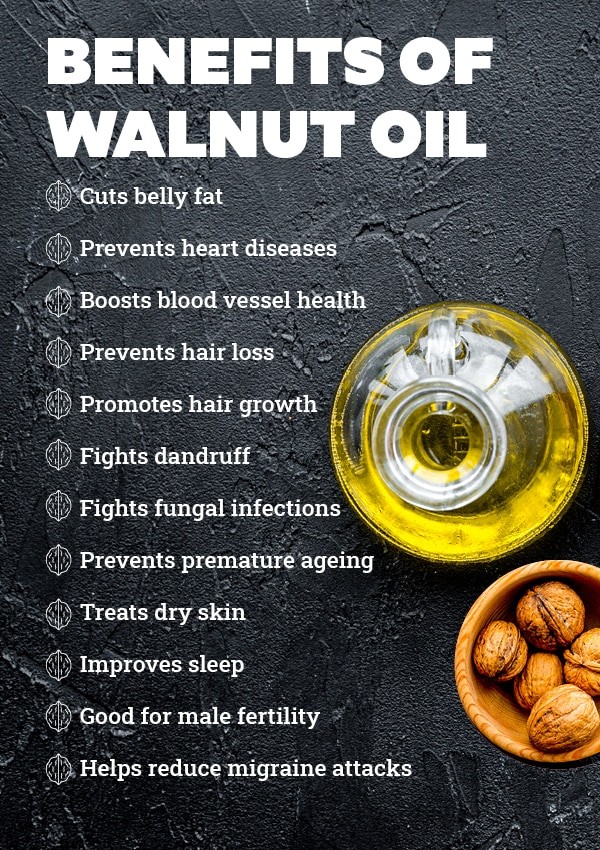
Benefits of Walnut Oil: Is it Better Than Olive Oil?
Walnut oil, rich in omega-3 fatty acid alpha-linolenic acid (ALA), offers numerous health benefits. It has anticancer properties, reduces inflammation, and lowers blood pressure. Compared to olive oil, walnut oil provides a superior source of good fats.
Derived from pressed walnuts, walnut oil is known for its nutritional value and high antioxidant content. It is particularly beneficial for its selenium content, making it one of the healthiest nuts.
The omega-3 fatty acid ALA, found in walnut oil, helps to reduce inflammation by inhibiting the production of inflammatory proteins. This powerful oil also exhibits anticancer properties, particularly against prostate cancer cells.
With regard to skincare, walnut oil is effective in enhancing skin quality as it contains essential fatty acids that promote wound healing, skin growth, and combat skin inflammation.
In addition, walnut oil can help decrease blood pressure and regulate blood sugar levels, making it beneficial for individuals with hypertension or type 2 diabetes.
As for cholesterol management, walnut oil, along with walnuts, is known to regulate cholesterol levels by reducing triglycerides and bad cholesterol.
Comparatively, walnut oil provides a better source of good fats than olive oil. While both oils contain beneficial compounds and nutrients, walnut oil’s higher content of polyunsaturated fatty acids, such as ALA, makes it a healthier option.
It is worth noting that walnut oil, like olive oil, should not be used for high-temperature cooking due to its susceptibility to break down. However, both oils can be enjoyed in various culinary applications and are excellent additions to any diet.
While walnut oil is generally safe for consumption, it is important to consume it in moderation to avoid weight gain. Individuals with nut allergies or who are taking specific medications should exercise caution and consult a healthcare professional.
Overall, walnut oil boasts a wide range of health benefits, making it a valuable addition to a well-rounded diet.
Findings from academic sources:
– American Journal of Clinical Nutrition: "Dietary alpha-linolenic acid inhibits proinflammatory cytokine production by peripheral blood mononuclear cells in hypercholesterolemic subjects," "Effects of tree nuts on blood lipids, apolipoproteins, and blood pressure: systematic review, meta-analysis, and dose-response of 61 controlled intervention trial," "Metabolism of polyunsaturated fatty acids by skin epidermal enzymes: generation of antiinflammatory and antiproliferative metabolites."
– American Journal of Medicine: "The Mediterranean diet, its components, and cardiovascular disease."
– Angiology: "Antihypertriglyceridemic effect of walnut oil."
– Cancer prevention research (Philadelphia, Pa.): "Effects of Walnut Consumption on Colon Carcinogenesis and Microbial Community Structure."
– Clinics in Dermatology: "Healing fats of the skin: the structural and immunologic roles of the omega-6 and omega-3 fatty acids."
– Critical Reviews in Food Science and Nutrition: "Health benefits of walnut polyphenols: An exploration beyond their lipid profile."
– European Journal of Nutrition: "Effect of walnut oil on hyperglycemia-induced oxidative stress and pro-inflammatory cytokines production."
– Food & Function: "Walnut polyphenol metabolites, urolithins A and B, inhibit the expression of the prostate-specific antigen and the androgen receptor in prostate cancer cells."
– Gynecologic and Obstetric Investigation: "The protective effect of peanut, walnut, and almond consumption on the development of breast cancer."
– International Archives of Allergy and Immunology: "Walnut Allergy in Peanut-Allergic Patients: Significance of Sequential Epitopes of Walnut Homologous to Linear Epitopes of Ara h 1,2 and 3 in Relation to Clinical Reactivity."
– International Journal of Endocrinology and Metabolism: "The Effect of Walnut Oil Consumption on Blood Sugar in Patients With Diabetes Mellitus Type 2."
– Journal of Diabetes Research: "Complications of Diabetes 2017."
– Journal of Nutrition: "Acute consumption of walnuts and walnut components differentially affect postprandial lipemia, endothelial function, oxidative stress, and cholesterol efflux in humans with mild hypercholesterolemia," "Walnuts decrease risk of cardiovascular disease: a summary of efficacy and biologic mechanisms."
– Journal of the American College of Cardiology: "Acute effects of high-fat meals enriched with walnuts or olive oil on postprandial endothelial function."
– Journal of the American Heart Association: "Dietary alpha-linolenic acid, marine omega-3 fatty acids, and mortality in a population with high fish consumption: Findings From the PREvención con DIeta MEDiterránea (PREDIMED) Study."
– Mayo Clinic: "Hypothyroidism diet: Can certain foods increase thyroid function?"
– NIH: "Omega-3 Fatty Acids."
– Nutrients: "A Walnut-Enriched Diet Reduces Lipids in Healthy Caucasian Subjects, Independent of Recommended Macronutrient Replacement and Time Point of Consumption: a Prospective, Randomized, Controlled Trial."
– Savva, S.C., Kafatos, A. Encyclopedia of Food and Health, "Vegetable Oils: Dietary Importance," Elsevier, 2016.
– USDA: "Oil, olive, salad or cooking," "Oil, walnut."
– Vascular Health and Risk Management: "Endothelial dysfunction: cardiovascular risk factors, therapy, and outcome."


